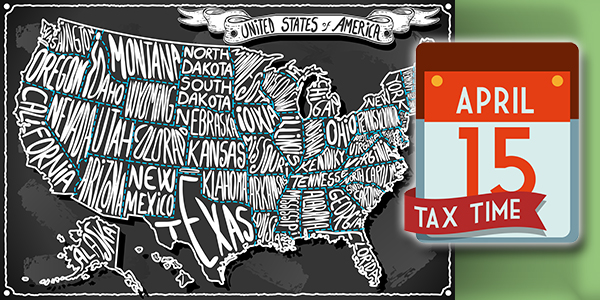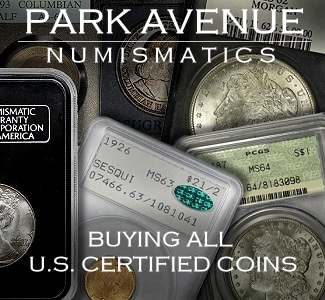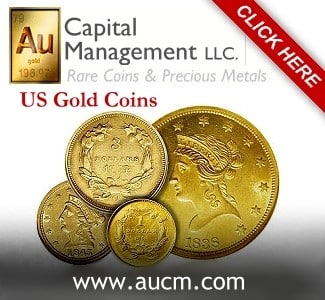
By Ron Drzewucki – www.moderncoinwholesale.com …..
Links to Part 1 | Part 2 | Part 3
In the U.S., sales tax is levied on a state and local level, so there is no one rule that fits all precious metal purchases. The complications wrought by conflict between the tax laws applying to the buyer versus the tax code applicable in the dealer’s location is inefficient and confusing at best, and inhibiting or even legally problematic at worst.
So to help our customers achieve a better understanding of the issue, Modern Coin Wholesale is happy to announce a new series of blog posts dedicated to a state-by-state breakdown of the relevant tax law pertaining to the sale and purchase of coins and bullion products.
As we do so, please keep in mind that Modern Coin Wholesale is not qualified to dispense legal advice and we are not at any time advocating a particular course of action. We are also not tax professionals. We merely wish to present this information in a relatively easy-to-understand way, enabling you, our customer, to judge for yourself what purchasing decisions are in your own best interest.
-Ron and the Staff at Modern Coin Wholesale
Oregon
- Sales Tax: none
There are five states that do not currently have a state sales tax: Alaska, Delaware, New Hampshire, Montana and Oregon. Numismatic coins, precious metals bullion products and other collectibles and wealth-protection instruments are therefore tax-free.
Pennsylvania
- Sales Tax: none
Currently, coins and precious metals are exempt from sales tax in the state of Pennsylvania (see page 31 of the Pennsylvania State and Local Sales, Use and Hotel Occupancy Tax booklet).
I say “currently”, because according to a November 19, 2015 alert from the Industry Council for Tangible Assets (ICTA), pending legislation in the state senate could repeal that exemption and subject numismatic and bullion items to sales and use taxes. The Pennsylvania sales tax rate is 6%, but the bill would also raise that to 7%.
But until that bill or a bill similar to it passes, it is important to note a few things:
Exonumia such as medals and tokens are subject to sales tax, as is paper money.
Sales within Allegheny County (Pittsburgh) are subject to a 1% local sales tax, while sales within Philadelphia are subject to a 2% local sales tax.
Rhode Island
- Sales Tax: none
While Rhode Island currently has a state sales tax rate of 7%, coins and precious metals bullion are exempt. Other numismatic collectibles, however, are not exempt, so keep this in mind when purchasing paper money, tokens and medals, etc.
South Carolina
- Sales Tax: none
Section 12-36-2120 (70) of the South Carolina Code of Laws indicates that “gold, silver, or platinum bullion, or any combination” thereof is exempt from state sales tax. Also exempt are paper money and coins that have been legal tender in the U.S. or elsewhere.
All other numismatic items not covered by these exemptions are subject to a 6% statewide base rate and up to an additional 1% sales tax in certain localities. There is no exemption based on the size of the transaction for such purchases.
South Dakota
- Sales Tax: none
“Coins, currency, or bullion” are exempt from South Dakota sales tax.
Helpfully, South Dakota is relatively more specific concerning the definition of “bullion”, which, according to state law, “means any bar, ingot, or commemorative medallion of gold, silver, platinum, palladium, or a combination of these metals where the value of the metal depends on its content and not the form”.
Coins and currency can be made of any material as long as the item or items in question serve or have served as legal tender, either in the United States or elsewhere.
FYI, South Dakota’s current sales tax rate is 4% but can go as high as 6% depending on the locality.
Tennessee
- Sales Tax: 7% – 9.75%
- Exemption: none
Tennessee’s tax regime is notable for not charging an income tax. Unfortunately, it makes up for this by charging high sales taxes.
Coins and precious metals bullion products are no exception.
A tax rate of 7% is charged on all transactions. Cities and other municipalities can charge as much as 2.75% more, for a maximum sales tax rate of 9.75%.
There are no exemptions.
Texas
- Sales Tax: none
As of 2013, there is no sales tax on precious metals and bullion products. Likewise, collectible coins are also completely exempt. Before 2013, the State of Texas charged a 6.25% sales taxes on bullion and coins but exempted transactions priced at $1,000 or above.
(For an explanation of what is meant by “transaction”, please read the Florida entry in Part 1.)
This change in tax law for bullion and numismatic products came about at least in part due to the tremendous efforts of ICTA and Texas-based dealer Michael Fuljenz. Building on their success in Texas, ICTA continues to work on behalf of buyers and sellers of precious metals to amend or repeal burdensome taxes on such products across the country.
Utah
- Sales Tax: none
The State of Utah exempts all legal tender coinage and “[any] ingot, bar, medallion or decorative coin containing at least 50 percent gold, silver or platinum that is not legal tender of any nation”.
The stipulation of “at least 50 percent” is interesting, and certainly covers a greater swath of the market than most state definitions.
Also interesting is the fact that Utah made gold and silver legal tender across the state in 2011.
Vermont
- Sales Tax: 6% – 7%
- Exemption: none
There is no state sales tax exemption for coins or precious metals bullion products in Vermont. A statewide base rate of 6% is charged on all transactions, though cities and local municipalities may charge up to an additional 1%
Virginia
- Sales Tax: 5.3% (6% in Northern VA)
- Exemption: none
All coins and precious metals bullion products are charged a statewide 4.3% sales tax and a 1% local sales tax in Virginia–with the exception of Northern Virginia, which charges an additional 0.7% for a nice, round total of 6%.
There are no exemption amounts.
Washington
- Sales Tax: none
Washington State specifically exempts all coins and bullion products from sales and use tax.
State law also specifically includes rhodium and palladium in its definition of what constitutes bullion.
West Virginia
- Sales Tax: 6% – 7%
- Exemption: none
West Virginia charges a 6% sales tax on all single-transaction purchases of coins and precious metals bullion products. There is no exemption.
Wisconsin
- Sales Tax: 5% – 5.6%
- Exemption: none
The State of Wisconsin charges a base rate of 5% sales tax on all purchases of numismatic coins and bullion. Local taxes can add as much as 0.6% total sales tax in some places.
However, if coins and currency are sold at face value, no tax is due. Also, citizens of Wisconsin are not charged sales tax on bullion if it is stored out-of-state. Go figure.
Wyoming
- Sales Tax: 4% – 6%
- Exemption: none
No exemptions here, which is somewhat surprising. Wyoming charges a statewide base rate of 4% on all purchases of coins and precious metals bullion products, with localities legally permitted to charge additional sales tax. Sales and use taxes in the State of Wyoming range between a minimum of 4% and a maximum of 6%.




